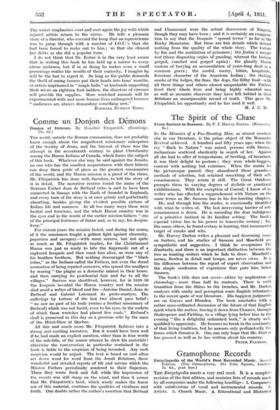Comme un Donjon des Demons
TuE world, outside the Roman communion, does not probably know enough about the magnificent missionary enterprises of the Society of Jesus, and the bravest of these was the attempt in the seventeenth century to plant Christianity among the Huron Indians of Canada, which forms the subject of this book. Whatever else may be said against the Jesuits, no one who has the smallest acquaintance with their history can deny them pride of place as the greatest missionaries of the world, and the Huron mission is a proof of the claim. Mr. Fitzpatrick has done well, therefore, to tell the story of it in detail. The narrative centres round the name of the Norman Father Jean de Brebeuf (who is said to have been connected in lineage with the Earls of Arundel in England), and every turn of the story is at once grimly and pathetically absorbing, besides giving the vividest possible picture of Indian life and manners. In all too many ways these were bestial and ferocious, and the whole Huron country was in the eyes and in the words of the earlier mission-fathers " one of the principal fortresses of Satan and, so to say, his donjon- keep."
For sixteen years the mission lasted, and during the course of it the missioners fought a gallant fight against obscenity, paganism and savagery—with some success, but not quite as much as Mr. Fitzpatrick implies, for the Christianized Huron was just as ready to bite the fingernails out of a captured Iroquois and then roast him alive, as were any of his heathen brothers. But nothing discouraged the " black robes," as the Indians called the Fathers, not even the dread accusation of being reputed sorcerers, who spread the smallpox by rearing " the plague as a domestic animal in their house, and then carrying its pestilential hair and fur to all the villages." Success was shortlived, however, for in 1649-50 the Iroquois invaded the Huron country and the mission died amid a welter of blood and fire—Antoine Daniel, Jean "de Brebeuf and Gabriel Lalemant its proto-martyrs. The sufferings by torture of the last two almost pass belief ; " we saw no part of his body (writes a brother missionary of Brebeuf) which was not burnt, even to his eyes, in the sockets of which these wretches had placed live coals." Brebeuf's skull is preserved to this day as a precious relic by the nuns of the Hotel-Dieu at Quebec.
All this and much more Mr. Fitzpatrick fashions into a strong and exciting narrative. But it would have been well if he had made an explicit mention, other -than in four words of the sub-title, of the source whence he drew his materials'. otherwise the conversation in particular contained in the book is liable to the suspicion of being invented. Any such suspicion would be unjust. The text is based on and often set down word for word from the Jesuit Relations, those wonderful and detailed reports of life and service which the Mission Fathers periodically rendered to their Superiors. These they wrote fresh and full while the impression of the events was still sharp on the mind, and thus it comes that Mr. Fitzpatrick's book, which wisely makes the freest use of this material, combines the qualities of vividness and truth. One doubts rather the author's assertion that Brebeuf and Chaumonot were the actual discoverers of Niagara, though they may have been ; and it is certainly an exaggere. tion to say that the Iroquois "spread terror " as far as the Rocky Mountains. But these are but details which detract nothing from the quality of the whole story. The torture by fire and the mutilation of prisoners ; the festins a manger tout (those disgusting orgies of guzzling, whereat the Indians gorged, vomited and gorged again) ; the ghastly Huron custom of burying an accumulation of years-long dead in a common grave ; the sordid, merry, bitter, hospitable, ferocious character of the American Indian ; the choking smoke of the lodges, the fleas, the dogs, the filthy food—with all these things and others almost unspeakable the Fathers lived their whole lives and being highly educated men as well as accurate observers they have left behind in their Relations an unsurpassable record of truth. This gave Mr. Fitzpatrick his opportunity and he has used it well.
M. J. C. M.








































 Previous page
Previous page